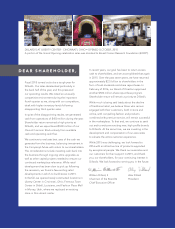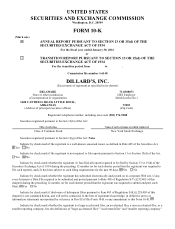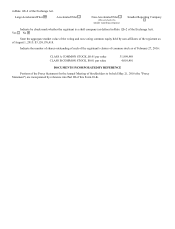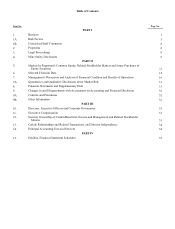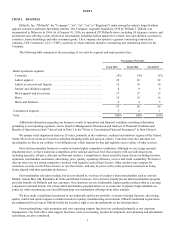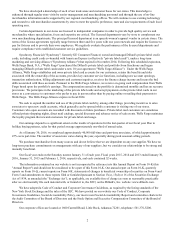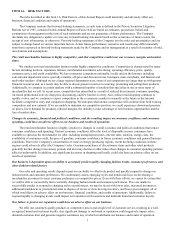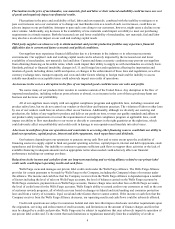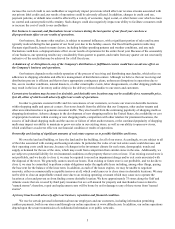Dillard's 2015 Annual Report Download - page 10
Download and view the complete annual report
Please find page 10 of the 2015 Dillard's annual report below. You can navigate through the pages in the report by either clicking on the pages listed below, or by using the keyword search tool below to find specific information within the annual report.4
Fluctuations in the price of merchandise, raw materials, fuel and labor or their reduced availability could increase our cost
of goods and negatively impact our financial results.
Fluctuations in the price and availability of fuel, labor and raw materials, combined with the inability to mitigate or to
pass cost increases on to our customers or to change our merchandise mix as a result of such cost increases, could have an
adverse impact on our profitability. Attempts to pass such costs along to our customers, however, might cause a decline in our
sales volume. Additionally, any decrease in the availability of raw materials could impair our ability to meet our purchasing
requirements in a timely manner. Both the increased cost and lower availability of merchandise, raw materials, fuel and labor
may also have an adverse impact on our cash and working capital needs.
Third party suppliers on whom we rely to obtain materials and provide production facilities may experience financial
difficulties due to current and future economic and political conditions.
Our suppliers may experience financial difficulties due to a downturn in the industry or in other macroeconomic
environments. Our suppliers' cash and working capital needs can be adversely impacted by the increased cost and lower
availability of merchandise, raw materials, fuel and labor. Current and future economic conditions may prevent our suppliers
from obtaining financing on favorable terms, which could impact their ability to supply us with merchandise on a timely basis.
Similarly, political or financial instability, changes in U.S. and foreign laws and regulations affecting the importation and
taxation of goods, including duties, tariffs and quotas, or changes in the enforcement of those laws and regulations, as well as
currency exchange rates, transport capacity and costs and other factors relating to foreign trade and the inability to access
suitable merchandise on acceptable terms could adversely impact our results of operations.
An increase in the cost or a disruption in the flow of our imported goods could decrease our sales and profits.
We source many of our products from vendors in countries outside of the United States. Any disruption in the flow of
imported merchandise, including strikes at ports at home or abroad, or an increase in the cost of those goods may harm our
business and decrease our profitability.
All of our suppliers must comply with our supplier compliance programs and applicable laws, including consumer and
product safety laws, but we do not control our vendors or their labor and business practices. The violation of labor or other laws
by one of our vendors could have an adverse effect on our business. Additionally, although we diversify our sourcing and
production, the failure of any supplier to produce and deliver our goods on time, to meet our quality standards and adhere to
our product safety requirements or to meet the requirements of our supplier compliance program or applicable laws, could
impact our ability to flow merchandise to our stores or directly to consumers in the right quantities at the right time, which
could adversely affect our profitability and could result in damage to our reputation and translate into sales losses.
A decrease in cash flows from our operations and constraints to accessing other financing sources could limit our ability to
fund our operations, capital projects, interest and debt repayments, stock repurchases and dividends.
Our business depends upon our operations to generate strong cash flow and to some extent upon the availability of
financing sources to supply capital to fund our general operating activities, capital projects, interest and debt repayments, stock
repurchases and dividends. Our inability to continue to generate sufficient cash flows to support these activities or the lack of
available financing in adequate amounts and on appropriate terms when needed could adversely affect our financial
performance including our earnings per share.
Reductions in the income and cash flow from our long-term marketing and servicing alliance related to our private label
credit cards could impact operating results and cash flows.
Wells Fargo owns and manages our private label credit cards under the Wells Fargo Alliance. The Wells Fargo Alliance
provides for certain payments to be made by Wells Fargo to the Company, including the Company's share of revenues under
this alliance. The income and cash flow that the Company receives from the Wells Fargo Alliance is dependent upon a number
of factors including the level of sales on Wells Fargo accounts, the level of balances carried on the Wells Fargo accounts by
Wells Fargo customers, payment rates on Wells Fargo accounts, finance charge rates and other fees on Wells Fargo accounts,
the level of credit losses for the Wells Fargo accounts, Wells Fargo's ability to extend credit to our customers as well as the cost
of customer rewards programs, all of which can vary based on changes in federal and state banking and consumer protection
laws and from a variety of economic, legal, social and other factors that we cannot control. If the income or cash flow that the
Company receives from the Wells Fargo Alliance decreases, our operating results and cash flows could be adversely affected.
Credit card operations are subject to numerous federal and state laws that impose disclosure and other requirements upon
the origination, servicing, and enforcement of credit accounts, and limitations on the amount of finance charges and fees that
may be charged by a credit card provider. Wells Fargo may be subject to regulations that may adversely impact its operation of
our private label credit card. To the extent that such limitations or regulations materially limit the availability of credit or


